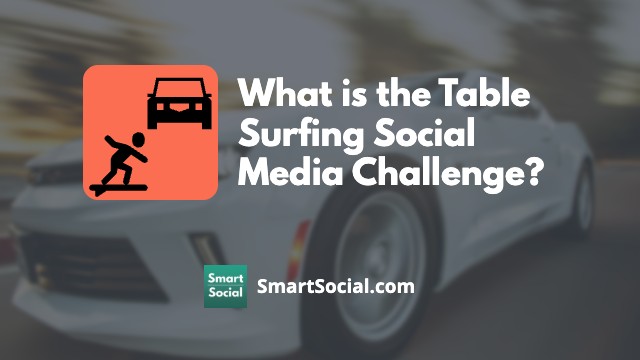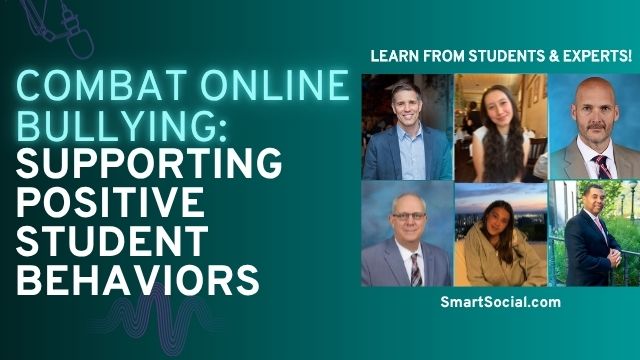Common Social Media Blunders & How to Avoid Them
Green Zone App
(Click here to learn more)
Dangerous Social media challenge
(Click here to learn more)
Red Zone App
(Click here to learn more)
Gray Zone App
(Click here to learn more)

College admissions officers and employers will rarely tell students if a student’s post offends them or raises eyebrows—but it will change their actions towards the student in the future. Making social media blunders can have a serious impact on a student’s opportunities. One of the best ways to teach students to avoid making mistakes online is to talk about social media blunders and their consequences. Listen along on our podcast:
So, we asked 5 experts “what are some social media blunders parents and educators should share with their students?” Read below for some common social media blunders parents can share and the best tips to avoid making those mistakes.
1. Being unprofessional online can cost students a recommendation

Andrew Selepak, University of Florida
Students are on social media and so are their teachers and professors. Social media has become more professional and less personal as we realize its value in building a brand. This means students are connecting with their professors on social media. This is a good thing. These connections can help students get recommendations or to build rapport. The problem is that their professors can see what they post including any negative comments or controversial statements or pictures. What could have been a recommender then becomes someone who no longer wants to stake their reputation on someone who makes unprofessional posts.
2. One social media post can dramatically affect the life of the person who made the post

Josh Ochs, SmartSocial.com
There are countless examples of how one social media post can dramatically affect the life of the person who made the post. So, it’s important for parents and educators to share social media blunder stories to students because it helps them understand the consequences of making mistakes online. Teach students to assume that everything they share online could eventually be discovered by their admissions officers, colleagues, and employer. Challenge students to ask themselves if what they're about to post has a little positivity or gratitude. If the answer is no, don’t post.
3. It’s a mistake to treat social media as a toy rather than a tool

Lemi-ola Erinkitola, The Critical Thinking Child
Social media platforms are a part of life these days. Almost every adult and teen has an account somewhere, be it Facebook, Snapchat, or Instagram. And most children, if they don’t have accounts, want one. So how do you avoid a social media faux pas? Common mistakes involve treating social media as a toy rather than a tool, giving students unlimited access, and failing to prepare a child for potential dangers. This can be overcome by turning social media time into a family activity, setting clear ground rules, and role-playing potential problems to help your child learn how to react appropriately.
4. Remember that the internet is the most public place of all

Justin Lavelle, BeenVerified
Never post anything that you will someday regret. This can be arguments, opinions, sayings, beliefs, pictures (especially photos just intended for one person), religious beliefs, political views, lists of friends, lists of enemies, dares, stunts, humor, or really any other thing you can think of. Social media can become the repository of regret for your life. What is cute, clever, or inconsequential now can be career, relationship, or friendship ending later. It never goes away! And the reality is, your views and perspectives may change over time. We used to have diaries or journals under lock and key to share our daily musings with. When we grew up, we just threw them away… problem, evidence, misguided childhood views gone. No problem. Unfortunately, you can’t do the same with the internet! Limit your sharing and what you share needs to be sanitized. The internet is no place for your deepest, darkest, most personal and intimate feelings. Always remember that the internet is the most public place of all!
5. Avoid posting pictures of controversial behavior

Rich Harris, Insomnia Graphix
One of the biggest mistakes we've seen people make on social media has to do with travel pictures. From work and school travel to long weekends or big vacations, sharing all of your itinerary details on social media is dangerous. Regardless of how private or secure your 'friends' list is, there are simple ways for your social media posts to get shared elsewhere. Many people post photos as they travel. Consider saving your photos and posts until your trip is over before posting them. The risk isn't only about announcing when and for how long you're away from your home, you also risk providing opportunities for identity theft, confidence scams and other unsavory practices. Another great piece of advice is about general publicity. Students should be reminded that at some point an interviewer, or other person whom they wish to impress, will look at their profile and see what has been posted. Do not post images or admissions of potentially illegal, abusive or controversial behavior. Keep your private posts private and be careful about your long term image. Before posting something on social media, ask yourself if you'd be comfortable with that posted on the side of your school, in the break room of your office or in your favorite restaurant.
Additional Resources
Protect your family and enter for a chance to win cool prizes
Become a member or log in to learn more on this topic
Protect your family and enter for a chance to win cool prizes

., start learning from this page to earn points!*
Hello, I'm Josh, the founder of SmartSocial.com.
Don't leave this page until you fill out our feedback form that will appear after you learn from the resources...
Become a Very Informed Parent (VIP) to get our social media suggestions in your email every Tuesday & Thursday.



Hello, I'm Josh, the founder of SmartSocial.com. Protect your family by taking my 1 minute quiz
This quiz will help you understand how safe your family is


Schools & Districts: Partner with us to protect your community online
Our remote presentations (and website) teach over a million parents and students each year how to be safe so they can shine online. We teach students how their accounts can be used to create a portfolio of positive accomplishments that impress colleges and employers.


Join Our Smart Social Podcast
each week on iTunes
With over 500 episodes, Josh Ochs interviews psychologists, therapists, counselors, teachers, and parents while showing you how to navigate social media to someday shine online.
Listen on:



.jpg)
.jpg)
.jpg)


